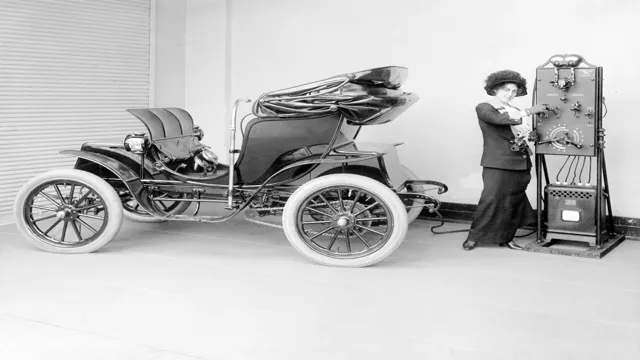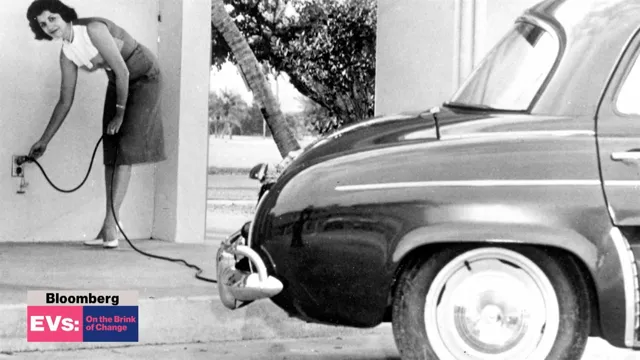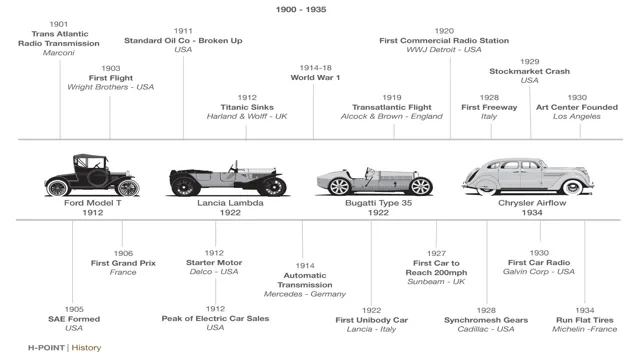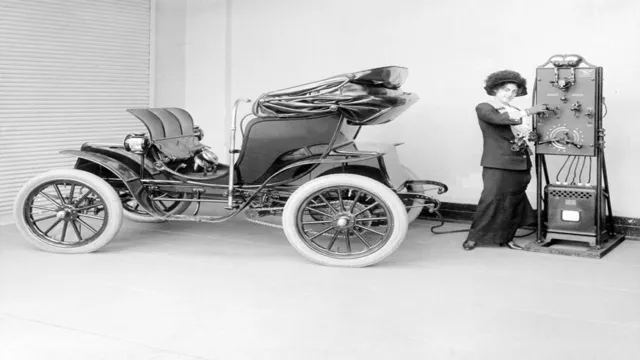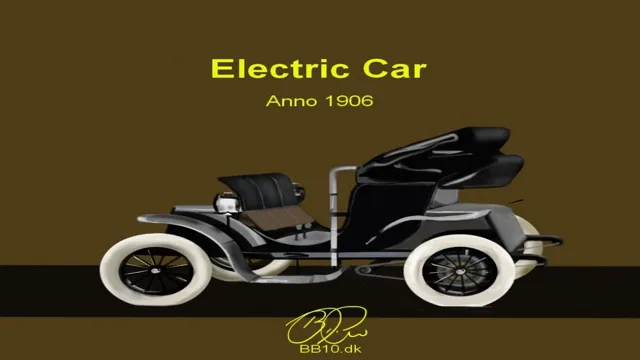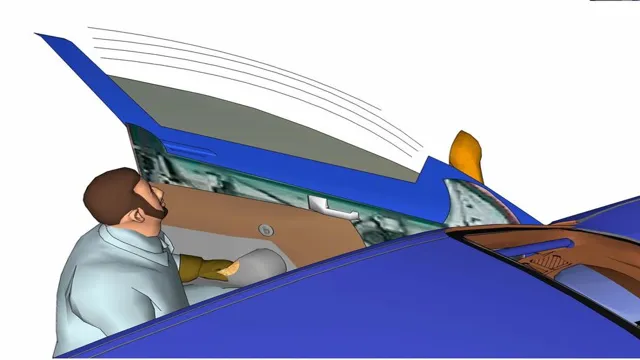Revolutionizing the Roads: Exploring the Brief History of Electric Cars
Looking into the future of the auto industry, it’s clear that electric cars will play a major role in the years to come. But what exactly are electric cars and how do they work? In this article, we’ll take a brief look at the history of electric cars, their benefits, and the technology behind them. Electric cars offer a cleaner and greener alternative to traditional fossil fuel-powered cars and are becoming increasingly popular among eco-conscious drivers and governments alike.
So, without further ado, let’s dive into the world of electric cars and explore their fascinating technology and benefits.
Early Beginnings
Electric cars have come a long way since their early beginnings. In fact, the first electric vehicle was developed over two centuries ago in the 1830s, but it wasn’t until the 1890s that they really made an impact on the automobile industry. At the time, electric cars had a number of advantages over their gas-guzzling counterparts.
They were quieter, easier to operate, and produced no pollution. In addition, they had a longer driving range and could reach higher speeds than most gasoline-powered cars of the time. However, with the discovery of oil in the early 20th century, gasoline became more widely available and less expensive, leading to a decline in the popularity of electric cars.
But with the growing concern for the environment and the need to reduce our dependence on fossil fuels, the popularity of electric cars has been on the rise in recent years. Today, electric cars are becoming more affordable, more practical, and more versatile than ever before, making them a viable option for everyday drivers.
19th Century Electric Car Prototypes
Electric Car Prototypes While it may seem that electric cars are a recent phenomenon, there were actually prototypes of battery-powered vehicles as far back as the 19th century. As early as the 1830s, inventors were experimenting with electric car designs, such as Thomas Davenport’s electric carriage. By the 1890s, electric cars had become more commonplace, with models like the Columbia Electric Victoria being popular among affluent city-dwellers.
These early electric cars were slow and had limited range, but they were clean and quiet, making them ideal for city use. Despite their limitations, they paved the way for future electric car development and ultimately contributed to the modern-day electric car revolution.
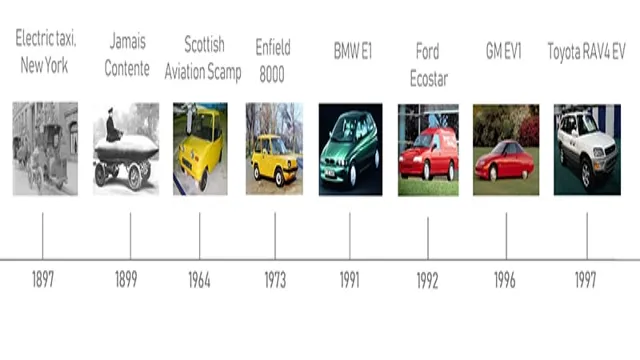
1900s – The Rise of Electric Cars
Electric cars have been around for a long time, dating back to the early 1900s. Many people don’t realize that the first electric car was actually built in the late 1800s, by a man named Thomas Parker. However, it wasn’t until the turn of the century that the popularity of electric cars began to rise.
In 1900, electric cars made up about a third of all vehicles on the road in America. This is largely due to the fact that gasoline-powered cars were expensive and unreliable. Electric cars, on the other hand, were seen as a more accessible and eco-friendly option, especially for city driving.
However, as advancements were made in the internal combustion engine, the popularity of electric cars declined, and it wasn’t until the 21st century that they began to make a comeback.
Decline of Electric Cars
Electric cars have had a brief history marked by various ups and downs. Initially introduced in the late 1800s, electric vehicles were quite popular and viewed as the future of transportation. However, the rise of gasoline-powered cars in the early 20th century led to the decline of electric cars.
This shift was amplified by advancements in gas engine technology and the discovery of large oil reserves, which made gasoline more affordable. In the 1990s, electric cars experienced a resurgence due to concerns over climate change and environmental pollution. In recent years, electric cars have become increasingly popular, with many automakers investing in developing and selling electric models.
However, there is still room for growth in terms of range and charging infrastructure. Nonetheless, the declining costs of battery technology and the phasing out of combustion engine cars indicate that electric cars have a promising future.
Competition with Gasoline Cars
The competition between electric cars and traditional gasoline vehicles has been ongoing for decades. Unfortunately, there has been a decline in the popularity of electric cars due to a lack of charging infrastructure and high cost compared to gasoline cars. Electric cars have not been able to keep up with the convenience and affordability of gas cars.
Despite the environmental benefits of electric vehicles, many consumers are hesitant to switch until there is more widespread charging availability and pricing becomes more affordable. Additionally, gasoline vehicles have seen improvements in fuel efficiency, making them more appealing to consumers who prioritize affordability and convenience over eco-friendliness. It’s a tough market for electric cars to break into, but manufacturers are continuing to innovate and improve.
As technology advances and infrastructure expands, it’s possible that we’ll see a resurgence in the popularity of electric vehicles in the near future.
Unavailability of Charging Stations
The unavailability of charging stations has been a major factor that has contributed to the decline of electric cars. While electric cars have become increasingly popular in recent years, the lack of charging infrastructure has created a major bottleneck that has prevented their widespread adoption. Unlike traditional cars that can be filled up at any gas station, electric cars require specialized charging stations that are not always easy to find.
This has made it difficult for electric car owners to travel long distances or even commute to work without worrying about running out of battery. As a result, many drivers have been hesitant to invest in electric cars, leading to a decline in their popularity. While efforts are underway to expand the number of charging stations, it remains to be seen whether this will be enough to reverse the trend and make electric cars a more viable option for everyday drivers.
Cheap Oil Prices
With the decline of oil prices, it’s no surprise that electric cars haven’t been selling as well as they used to. After all, the main appeal of electric cars is their lower cost of ownership compared to traditional gas-powered vehicles. But when gas prices drop significantly, the cost savings of going electric become less apparent.
This shift has led to a decline in sales of electric cars, with consumers opting for cheaper, gas-guzzling options. Additionally, the initial investment of buying an electric car is still relatively higher than a gas-powered car, making it harder for consumers to justify the purchase. However, it’s important to remember that the long-term cost savings of owning an electric car still exist, and the environmental benefits of reducing our reliance on fossil fuels are undeniable.
As such, we must continue to push for policies and incentives that make electric cars more accessible and affordable for everyone.
Revival of Electric Cars
Electric cars have been around for over a century, but it wasn’t until the 21st century that they began to surge in popularity. In the early 1900s, electric vehicles were popular among the wealthy due to their quiet operation and lack of fumes. However, the rise of gasoline-powered vehicles and the high cost of batteries led to a decline in electric car production until the 1990s.
The revival of electric cars in recent years can be attributed to advancements in battery technology, government incentives, and increased environmental awareness. Today, electric cars offer a viable alternative to traditional gasoline-powered vehicles, with lower operating costs and zero emissions being some of the main benefits. As more and more automakers are investing in electric cars, it is clear that the future of the automotive industry is electrifying.
1990s – California Air Resources Board’s ZEV Mandate
In the 1990s, the state of California made a bold move to revive electric cars by implementing the Zero Emissions Vehicle (ZEV) mandate. The California Air Resources Board (CARB) required automakers to sell a certain percentage of zero-emission vehicles in the state, starting in 199 This mandate brought attention to electric cars once again and led to the development and production of new models by major automakers, including the GM EV1, Ford Ranger EV, and Nissan Altra EV.
The ZEV mandate also paved the way for more advanced electric vehicles, such as the Tesla Roadster, which was introduced in 200 Despite some initial pushback from automakers and concerns about the feasibility of electric cars, the ZEV mandate ultimately proved to be a successful policy in spurring the growth and innovation of the electric car industry.
Tesla’s Role in Electric Car Revolution
Electric cars are undoubtedly on the rise, and Tesla has undoubtedly played a significant role in this revolution. Tesla’s electric cars are fast, fun, and environmentally friendly, and the company has been incredibly successful in bringing electric cars to the masses. Tesla’s success has undoubtedly hastened the transition to electric cars, as other automakers have taken notice and started to produce their electric cars.
Furthermore, Tesla’s emphasis on innovation and high-quality design has helped to alter public perceptions of electric cars from mundane and slow to sleek and desirable. In conclusion, Tesla’s contribution to the electric car revolution cannot be overstated; electric cars are here, and they are here to stay.
Future of Electric Cars
Electric cars have come a long way since their inception in the 1800s. The first electric vehicle was developed in 1832 by Scottish inventor Robert Anderson, but it wasn’t until the 1970s oil crisis that electric cars gained popularity as a solution to the dependence on fossil fuels. However, early models were limited by their range and high cost compared to traditional gas-powered vehicles.
In recent years, advancements in battery technology and production have allowed for more affordable and longer-range electric cars to hit the market. As the world shifts towards sustainability, the future of electric cars looks promising with major car manufacturers committing to producing more electric models, and countries setting targets for banning gas-powered vehicles in the coming years. With the electric car market expected to continue growing, it is exciting to see how this technology will continue to develop and shape the future of transportation.
Government Initiatives for Clean Transportation
Electric Cars In recent years, the push for clean transportation has gained momentum worldwide. Governments around the globe are introducing initiatives to encourage the adoption of electric cars and other eco-friendly modes of transportation. The future of electric cars is looking bright, with advancements in technology making them more efficient and affordable.
Incentives provided by governments, such as tax credits and subsidies, are encouraging more consumers to make the switch to electric vehicles. Moreover, with an increase in the number of electric charging stations, range anxiety is becoming less of a concern for individuals considering purchasing an EV. The potential benefits of electric cars abound, from reducing carbon emissions to lowering air pollution levels.
While there are still some challenges to overcome in terms of infrastructure and customer adoption, the future looks promising for electric cars and the further development of clean transportation.
Advancements in Battery Technology
Today, advancements in battery technology are rapidly changing the future of electric cars. The goal is to create batteries that are both more efficient and cost-effective, allowing electric vehicles to become more mainstream and affordable. These batteries are typically made using lithium-ion cells, but researchers are constantly working on new ways to improve their efficiency and energy density.
Some of the latest breakthroughs include solid-state batteries, which use a solid electrolyte instead of a liquid one, and lithium-sulfur batteries, which have the potential for higher energy density. As these technologies continue to be refined and improved, we can expect electric vehicles to become more accessible and practical for everyday use. With greater range and faster charging times, electric cars could soon become the norm, replacing traditional gas-powered vehicles and helping to create a more sustainable future.
Electric Cars as the Future of Transportation
Electric Cars Electric cars are the future of transportation. In recent years, many people have become increasingly concerned about the environmental impact of cars and the use of fossil fuels. Electric cars offer a solution to both of these problems, as they emit zero emissions and use renewable energy.
Not only are electric cars better for the environment, but they also offer a more efficient and cost-effective way to travel. With increasing advancements in battery technology, electric cars can travel longer distances on a single charge and provide a more comfortable driving experience. Additionally, the cost of owning an electric car is becoming more affordable, making it a viable option for more people.
As more and more consumers make the switch to electric cars, it is likely that they will become the main mode of transportation in the future. With a lower environmental impact and a more efficient means of travel, it’s not hard to see why electric cars are the future.
Conclusion
So there you have it, folks. In the brief history of electric cars, we’ve come a long way from bulky battery packs and limited range. From the humble beginnings of the Baker Electric in the early 1900s, to the sleek and modern Tesla Model S, the electric car has finally found its stride.
As we look to the future, it’s clear that electric cars are here to stay. With advancements in battery technology and charging infrastructure, it won’t be long before electric cars are the norm on our roads. Who knows, in a few decades we may look back and wonder how we ever got by with those noisy, polluting gas guzzlers.
And in the meantime, let’s enjoy the quiet, smooth ride of our electric automobiles – the wave of the future.
FAQs
What is the history of electric cars?
The history of electric cars dates back more than a century, with the first electric vehicle being developed in the late 1800s. However, their popularity and widespread usage declined with the advent of gasoline-powered cars, only to see a resurgence in recent years due to concerns about climate change.
Who developed the first electric car?
The first electric car was developed by Thomas Davenport in the US in 1835, although it was not until 1884 that the first practical electric car was built by Thomas Parker in the UK.
How do electric cars work?
Electric cars use batteries to power an electric motor that drives the wheels. When the batteries run low, they can be recharged by plugging the car into an electric outlet or a charging station.
What are the advantages of electric cars over gasoline-powered cars?
Electric cars are more environmentally friendly than gasoline-powered cars, as they produce no emissions during operation. They are also cheaper to operate, with lower fuel costs, and require less maintenance due to having fewer moving parts. Additionally, they offer a quieter and smoother ride than traditional cars.
